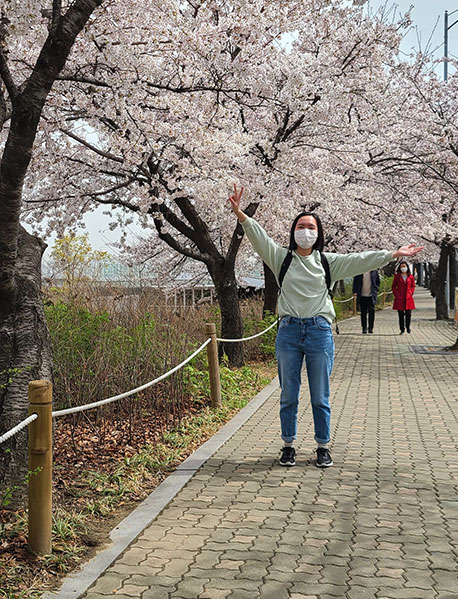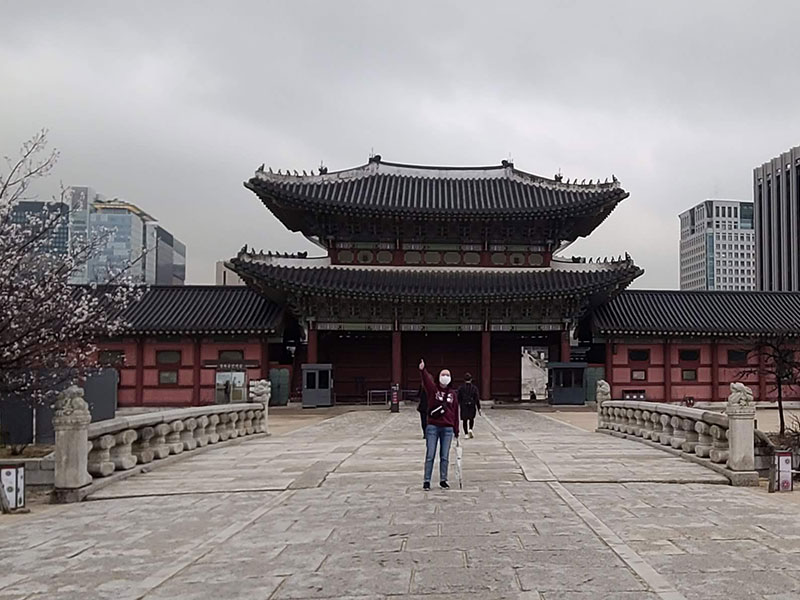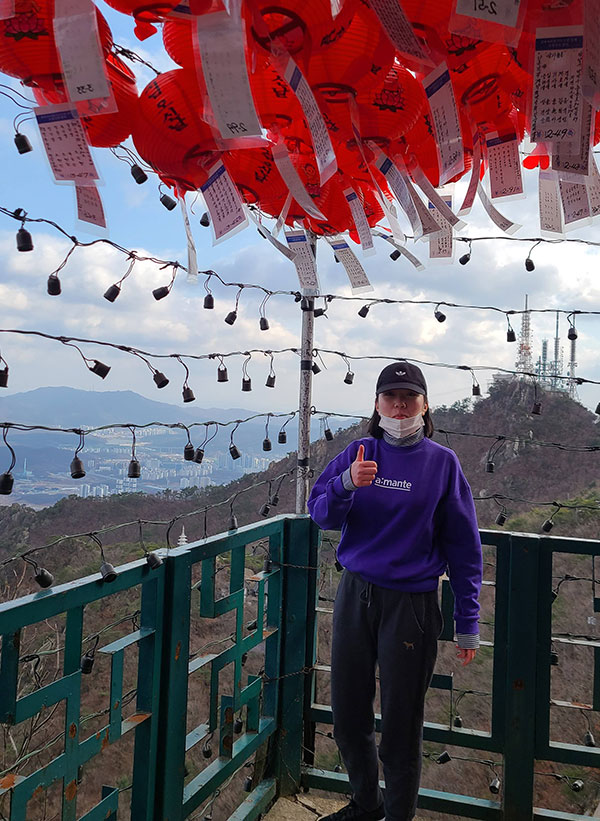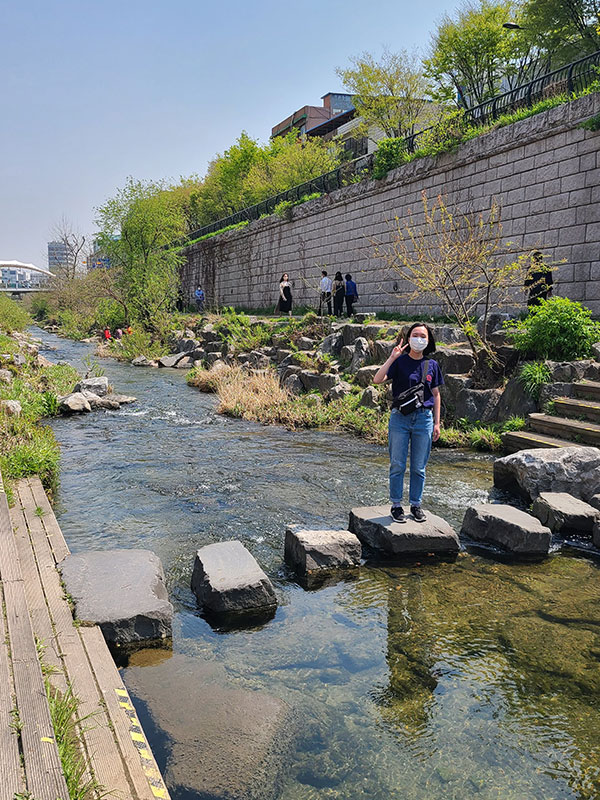Environmental engineering major Elizabeth Le shares her experiences studying at Hanyang University in South Korea.

Elizabeth Le on the path near the National Assembly building in Yeouido during peak cherry blossom season
As an incoming freshman, I was very excited to learn that studying abroad would be a viable goal to achieve at some point in my career at Drexel. I was not well-traveled coming into college, which made me all the more passionate about getting to experience a term abroad. Eager to figure out what my options were, I started to look into study abroad options, discussing the prospect of it with peers and others at Drexel. The responses I received were discouraging at first. I heard from many that they didn’t know of many engineers that studied abroad or thought that it would be a very difficult goal to achieve given our rigid curriculum. I remember some being worried that I would be behind in my classes, it would interfere with scheduling, it would be hard to find equivalent courses at foreign universities, it would be hard to find engineering courses in English, that studying abroad isn’t relevant to our major, etc. As an environmental engineer who studied abroad during my sophomore year, even during the pandemic to complicate things, I want to say, “Never fear! Your options are here!”
It’s important to mention that there will be an element of struggle in the process of planning your study abroad experience; it’s impossible for it to turn out perfectly. The key to success is being flexible and willing to make sacrifices. If you’re aiming to study abroad as an engineer, making it your top priority will create a greater chance of success. It is not a goal that you want to leave on the backburner. Here are some key points in my planning process and realizations I had after I returned to the U.S. that can help convince you to consider studying abroad as an engineer during your time at Drexel.
Securing Funding
As a college student, one of the main worries with studying abroad is finding a way to fund it. This was my number one issue to tackle as someone who didn’t have any expendable income. However, I quickly came to realize that I had a few options, especially considering my financial situation. To explain my eligibility, I was, at the time, a sophomore environmental engineering major. I am a first-generation Vietnamese American college student who was looking to study abroad in Seoul, South Korea. There are typically region/country specific scholarships as well as some specific to major or income level. These can be easily found by searching on the internet, but one tool that you should definitely utilize is Drexel’s Fellowship Office under the Office of Undergraduate Research and Enrichment Programs (UREP).

Visiting Gyeongbokgung palace, the largest palace built during the Joseon Dynasty. It has been destroyed and restored multiple times.
My study abroad advisor suggested that I apply for the Gilman Scholarship, and then directed me to the Fellowships Office. After getting in contact with an advisor at UREP, I was informed of other relevant scholarship opportunities. Besides external scholarships, there are also scholarships from Drexel, specifically offered to study abroad students that can help fund your trip, including ones based on financial need. If you also have work study funding, you can apply to be a student blogger for the study abroad office and be reimbursed as long as you submit a certain number of posts during your term abroad. Also, it is likely that you will be planning to study abroad after your first co-op term; consider saving your income for your trip. At the end of the day, however, the Gilman Scholarship turned out to be the highest contributing monetary factor to my total funds by the time I left for my term abroad.
It’s no exaggeration to say that without the Gilman Scholarship, I would not have been able to study abroad. I knew that I was going into the study abroad process riding on the chance of receiving scholarships and I was honestly prepared for the entire endeavor to fall through. The Gilman Scholarship seemed a little intimidating and a out-of-reach at first, but if you are Pell Grant eligible, chances are that you are more likely to receive the scholarship than you might think. Approximately one in four applicants are chosen every round and selection happens twice a year depending on your intended departure. The scholarship awards $5,000, but there is also a choice to apply for an $8,000 award if you intend to study a language that the program has categorized as a critical need language. I applied for the critical-need award, which required additional writing to be submitted, and I appreciated the help of the Drexel Fellowships Office. After contacting their office, I was assigned an advisor who helped me revise my essays several times. The help that I received throughout the application process is something that I am incredibly appreciative of. I don’t think I could have received the scholarship without their critique and advice. I am also thankful for the Gilman Program as they continued to offer the scholarship during the pandemic and offered plenty of resources to help navigate country-specific Covid-19 restrictions.
Having Travel Ideas Ready

Hiking Gwanaksan, one of the numerous mountains in Seoul. We were pleasantly surprised to find a small temple at the top.
Having a list of places ready to discuss with your study abroad advisor or a list of “must-haves” in a destination will be helpful in the long-run. For example, I informed my advisor that I had a specific region in mind, East Asia, because I was interested in the culture and language of those countries. From then on, I also established that I would probably like to go with the cheapest option in terms of overall cost. This is how I decided to go to Seoul, South Korea. Deciding on a location and a university early in the application process will allow you more time to figure out what prior steps you will have to take to meet all deadlines. If you decide to study your intended host country’s language, you may need to take language classes ahead of time and will also need to know what level of fluency you will need to achieve before you leave. Knowing the reasons why you picked a particular country or university will provide more of a purpose when writing essays about why you picked your destination.
Building Your Plan of Study Ahead of Time
Starting to plan your term abroad early enough in your college career ensures plenty of time to save some money and be aware of due dates. It’s crucial to start early; this way, you’ll also be able to see all the possible ways the rest of your time at Drexel will unfold and be able to adjust your curriculum accordingly. I walked into the Study Abroad Office on a whim in the middle of my first winter term here. I knew nothing of the process and only knew that I wanted to explore the possibility of studying abroad. That one visit made me realize that the goal was closer in reach than I initially thought. I would just have to work diligently towards it.

Visiting Cheonggyecheon, a stream that flows through downtown Seoul. It is the product of an urban renewal project and is a restoration of a stream that had previously existed.
Deciding on a university early in the process allowed me to rearrange the schedules of the next few terms to make room for the term abroad and to see how the pre-requisite courses I needed to take impacted my plan of study. In my experience as an engineering major, it’s best to study abroad early in your college career. As far as I know, it’s not possible to study abroad senior year due to senior design courses. It can also be very difficult to find equivalent courses in English at your intended university abroad as courses become more major-specific in your pre-junior/junior year. This does depend on your major and on the courses offered at your host university, however. For some destinations, you will easily find 300-level courses taught in English. In my case, finding equivalent courses proved to be difficult. There is also the option of taking courses in your host country’s language, but this would mean you’d have to be fluent before leaving.
There is a misconception that there is simply not enough room in the curriculum for engineering majors to study abroad, but that’s not true! It is important to maintain flexibility with what study abroad goals can or cannot be achieved. For the CAEE Department, the curriculum is initially similar across the three majors (Civil, Architectural, and Environmental Engineering), until a point in pre-junior year, so consider going abroad your sophomore year. It helps to come in with AP credit freshman year and to take courses over co-op to allow for more room. Most students try to find equivalent courses abroad so that they are not too far behind when coming back. Falling behind isn’t necessarily a bad thing as well. If you’re willing to take classes late, assume that you’ll graduate on time. Scheduling a chat with your academic advisor and working on alternative schedules in Degreeworks can help you schedule ahead. I don’t think there’s much to worry about; personally, although I am behind two classes, I am still on track to graduate on time and have even successfully switched majors recently.

Having biked along the Han River, a river that runs through the entirety of Seoul, we came to rest at one of the many convenient recreational/public spaces along the banks.
It’s a Once in a Lifetime Chance
Studying abroad is a once in a lifetime chance to immerse yourself in a culture without having the typical everyday responsibilities of a full-time employee. It’s a chance to force yourself to potentially apply foreign language skills (if applicable) in a university and local community setting. I improved my Korean speaking and listening fluency over my term abroad. It was also the first time I ever traveled outside of the country in my life, so I constantly felt as if I was having epiphanies and eye-opening experiences about culture differences. I don’t think it’s an exaggeration to say that it was the most exciting and valuable experience I’ve had thus far. I was able to connect with so many peers not only from my host country, but from all over the world. I experienced the difference of a university education in Seoul and also witnessed how the pandemic was handled differently. I did a variety of things in South Korea. If you’re interested in reading more about it, read the blogs I wrote for the study abroad office.
If traveling seems like a far-off idea to you, like it once was for me, you should consider going to a study abroad 101 info session or schedule an appointment with the Study Abroad Office. Of course, even if you make it past all of the obstacles listed above, there still remains the struggle of studying abroad in a pandemic. Tackling the added paperwork and additional steps associated with Covid-19 can be daunting, but it’s worth it in the end. The key is to be flexible with your goals, have a back-up country or university, be prepared to change your intended term abroad, or even switch co-op cycles to be able to go with your first choice. Studying abroad will continue to be dynamic in the coming years, so be prepared. However, no one knows when this pandemic will be over, so it’s best that you seize the opportunity now!